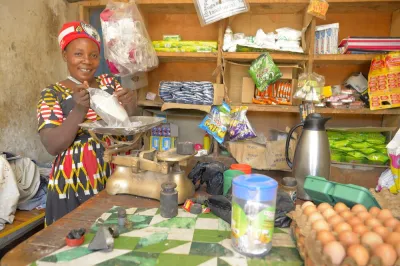Exploring New Markets Through Disaggregated Customer Data

Financial service providers (FSPs) in Nigeria face increasing competition as new players, such as fintech and agtech companies, come on to the scene and target their clients.
Unfortunately, most FSPs still do not have enough reliable information on the client segments they aim to reach, such as smallholder farmers and value chain actors. Too often, they rely on anecdotes and fall prey to preconceived notions and biases that affect strategic decisions, risk assessment and innovation processes. And most management teams cannot allocate significant research budgets while they are only in the initial stages of business development. So, they usually have to argue the case for expansion and market development based on competitor activity and narratives from the field which are not always accurate.
They need relevant data on different market segments, and they need to be able to analyze that data to help them make smart business decisions.
Disaggregated customer data exists, but sources are fragmented and not easily accessible to financial service providers
In response to this need, the Scale2Save program supported its partner FSPs with relevant insights on prospective customer segments from a variety of sources. In addition to primary research studies, including financial diaries in Nigeria, Scale2Save identified several public datasets that could help FSPs assess the potential size of certain opportunities and get to know the customers. These data sources include the regularly conducted Demographic and Health Survey (DHS), the EFInA Access to Financial Services survey, as well as household census data, agriculture surveys and small business surveys.
The DHS and EFInA surveys are representative at a national level and contain business-critical information, such as insights into livelihoods and household configuration, mobile phone access and usage indicators, and digital financial services. However, insights concerning particular customer segments are often hard to tease out from large survey datasets and reports. FSPs have limited capacity to engage with these formats, as it can require analyst skills, statistical software and a dedicated team to develop indicators that can inform business decisions.
Towards a common marketplace for customer data: A web portal to consolidate data and make information more accessible
The Scale2Save Persona Segmentation Toolkit offers an initial approach to developing an accessible, open tool that allows FSPs to use public datasets for simple market segmentation analysis. It can support exploratory discussions and strategic and operational decision-making and serve as a reference point in the meeting rooms of banks and MFIs.
The web portal collates the data from the two surveys and offers insights into financial access and usage, livelihoods and income, demographic and socio-economic characteristics, and mobile and digital connectivity of households and individuals in Nigeria. Different types of information and data are provided in one place, with the vision to turn the portal into a one-stop hub for data.
How financial service providers are using this data
Use cases are still emerging and include:
- Assessment of prospective business opportunities for specific, non-traditional market segments that can be explored by gender, age, income, location, usage of financial products, mobile and internet usage, social situation, household parameters, etc.
- Design of effective customer market research frameworks by informing selective sampling of targeted customer groups.
- Applications in strategic and operational planning.
For example, an FSP that wishes to develop personas for primary marketing research can explore the livelihoods and living situation of young women aged 18 to 25 in Nigeria who are in possession of a mobile phone but without a bank account. In this case, the data reveals that in the rural outskirts of Lagos state, three-quarters of women have moved out to start their own families or live on their own. One-third of these women work in farming, and 40 percent of these female farmers are self-employed. The financial lives and needs of these prospective customer segments probably differ in ways that the FSP can explore to develop more relevant financial products and messages for each segment.
Similarly, market research activities could explore the differences between those young adults who use the internet at least weekly, and those who don’t, in order to better understand digital skills and literacy, as well as to explore trust for digital financial services.
One of our FSP partners found that the Scale2Save toolkit also offered a starting point to explore the livelihoods and income sources of prospective customers in the Northern states of Nigeria. While this region had been previously identified as an opportunity to expand into lesser served markets, FSPs had little information available to assess the viability of such a move.
Expanding access to data is a collaborative effort
The Scale2Save Persona Segmentation Toolkit is the result of a productive collaboration, developed by Scale2Save together with EFInA and our partner FSPs, and hosted by the L-IFT FINBIT portal. After many iterations, the tool, guidebook and video were launched in October 2022 and are now accessible to all financial sector professionals in Nigeria.
Further efforts are currently underway to extend the tool to other markets and to include additional features that help FSPs better know their customers and help smallholders adapt to climate risk. For example:
- The L-IFT FINBIT app, in which farmers record their own livelihood and financial data, puts the power of data into farmers’ hands and improves self-management of their financial lives.
- A credit-scoring model based on FINBIT data enables FSPs to offer formal loans to underserved populations.
- A climate-smart irrigation tool provides advice to farmers and reports micro-level moisture and crop results through the FINBIT app.
- A satellite-data-driven proximity tool geolocates farmers’ data and improves service delivery.
Scale2Save continues its collaborative efforts to make public datasets available to private and public sector stakeholders in relevant and user-friendly ways.
For more insights into FINBIT, visit the FinEquity Tools Clinic on 27 June.


